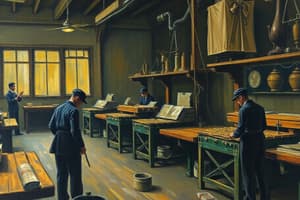Podcast
Questions and Answers
What was a key element of scientific management used by Ford Motor Company?
What was a key element of scientific management used by Ford Motor Company?
- Infrequent product design changes
- High manufacturing costs (correct)
- Unstandardized labor specialization
- Mechanized assembly lines
Which factor was recognized by researchers in the Hawthorne Studies as affecting production?
Which factor was recognized by researchers in the Hawthorne Studies as affecting production?
- Standard operating procedures
- Government regulations
- Physical working conditions
- Psychological and sociological factors (correct)
What was the main purpose of operations research (OR) teams during World War II?
What was the main purpose of operations research (OR) teams during World War II?
- To set standard production rates
- To simplify management structures
- To deploy resources effectively (correct)
- To reduce service costs
What significant change occurred in service organizations after World War II?
What significant change occurred in service organizations after World War II?
What major trend has occurred in the US workforce since World War II?
What major trend has occurred in the US workforce since World War II?
What is the main focus of production management?
What is the main focus of production management?
What is not covered by operations management?
What is not covered by operations management?
Which type of production method is characterized by completing only one product at a time?
Which type of production method is characterized by completing only one product at a time?
What benefit does effective planning in operations management provide?
What benefit does effective planning in operations management provide?
In batch production, what aspect can the manufacturer decide?
In batch production, what aspect can the manufacturer decide?
What role does quality control serve in operations management?
What role does quality control serve in operations management?
Which of the following is a characteristic of mass production?
Which of the following is a characteristic of mass production?
What is a likely outcome of improved process efficiencies in operations management?
What is a likely outcome of improved process efficiencies in operations management?
What is mass/flow production primarily used for?
What is mass/flow production primarily used for?
Which manufacturing process is characterized by the continuous production of high-volume goods?
Which manufacturing process is characterized by the continuous production of high-volume goods?
Who is recognized as the father of scientific management?
Who is recognized as the father of scientific management?
What key development allowed factories in the late 1700s to gain machine power?
What key development allowed factories in the late 1700s to gain machine power?
Which industry was the first great industry in the United States?
Which industry was the first great industry in the United States?
What significant invention did Eli Whitney develop in 1790?
What significant invention did Eli Whitney develop in 1790?
During the post-Civil War period, what primarily contributed to increased production capacity?
During the post-Civil War period, what primarily contributed to increased production capacity?
Which of the following was a key aspect of the industrial revolution?
Which of the following was a key aspect of the industrial revolution?
What is production defined as in the context of operations management?
What is production defined as in the context of operations management?
Which of the following reflects a significant factor affecting operations management?
Which of the following reflects a significant factor affecting operations management?
What role does an operating system play in a computer?
What role does an operating system play in a computer?
What is a primary benefit of advances in computer and communication technologies?
What is a primary benefit of advances in computer and communication technologies?
What does production management encompass in a typical manufacturing environment?
What does production management encompass in a typical manufacturing environment?
Which of the following is not a main function of an operating system?
Which of the following is not a main function of an operating system?
Which statement best describes the role of Enterprise Resource Planning (ERP) software?
Which statement best describes the role of Enterprise Resource Planning (ERP) software?
What is one result of widespread use of email in business environments?
What is one result of widespread use of email in business environments?
Flashcards are hidden until you start studying
Study Notes
Production and Operations Management
- Production and operations management involves transforming an organization's resources into goods and services.
- Production management focuses on creating products.
- Operations management encompasses the production and delivery of products and services.
What is Operations Management?
- It's the process of converting an organization's inputs/resources into final goods or services using defined, controlled, and repeatable policies.
- Policies are rules that add value to the final output.
- Effective operations management ensures:
- On-time deliveries
- Optimized resources
- Consistent quality
- Seamless workflow
- Increased productivity
Four Types of Production
- Job Production: Creating a unique product for each customer's specific needs, often called "jobbing" or "one-off production".
- Batch Production: Producing identical groups of products simultaneously. The manufacturer determines the size of the batch and how often it's produced.
- Mass Production/Flow Production: Using standardized designs, machinery, and assembly line techniques to produce large quantities of goods.
- Continuous Production/Process Production: Traditionally used for high-volume, non-customized products such as paper, petrochemicals, or oil and gas, and essential products like electricity or water treatment.
Organizational Model
- Production and Operations Management (OM) is a crucial part of the organization alongside Finance, Sales, HRM, Marketing, MIS, Accounting, and Engineering.
- Quality Assurance (QA) is closely linked to OM.
Historical Evolution of Production Management
-
The Industrial Revolution (1700s):
- Steam engine replaced manual labor, leading to factory systems.
- Adam Smith's "The Wealth of Nations" emphasized the benefits of labor specialization.
- Eli Whitney (1790s): Developed interchangeable parts.
- Textile Industry: The first major industry in the US.
- 1800s: Gasoline engines and electricity further revolutionized production.
- Mid-1800s: The factory system replaced cottage production.
-
Post-Civil War Period (1860s Onwards):
- Significant expansion of production capabilities.
- Growth in capital, workforce, and Western markets.
- Development of a national transportation system.
-
Scientific Management (Late 1800s-Early 1900s):
- Frederick Taylor: "Father of Scientific Management".
- Implemented a system that focused on:
- Determining individual worker strengths and abilities.
- Time and motion studies to set production standards.
- Standardized materials, methods, and work flow.
- Careful selection and training of supervisors.
- Incentive pay systems.
-
Ford Motor Company (1920s): Scientific Management in Action
- Standardized product designs
- Mass production
- Low manufacturing costs
- Mechanized assembly lines
- Specialization of labor
- Interchangeable parts
-
Human Relations and Behavioralism (1927-1932):
- Hawthorne Studies: Revealed the impact of human factors on production.
- Managers began to understand the psychological and social effects on workers.
- Led to changes in management approaches towards employees.
-
Operations Research (World War II):
- Military Operations Research Teams: Developed to manage complex resource allocation.
- After the war, OR found applications in universities, industries, and government.
- Helps managers make informed decisions when dealing with complex, high-stakes problems.
-
The Service Revolution (Post-World War II):
- Rapid growth of services industries.
- Services now account for over two-thirds of the US workforce and GDP.
- Significant trade surplus in services.
- Investment in office workers now surpasses factory worker investment.
- Increased need for service operations management.
-
The Computer Revolution:
- Explosive growth in computer and communication technologies.
- Easy access to information.
- Advancements in software applications like Enterprise Resource Planning (ERP).
- Widespread use of email.
- More companies engaging in e-business through the internet.
- Result: Faster, more effective decisions over longer distances.
Factors Affecting Operations Management
- Global competition
- Quality, customer service, and cost challenges
- Rapid advancement of technologies
- Growth of the service sector
- Social responsibility issues
- Scarcity of capital and materials
Concepts of Production
- Production: Combining materials and intangible inputs (e.g., plans, knowledge) to create goods or services for consumption.
- Production System: A computer program (often with artificial intelligence) that uses a set of rules to guide behavior, along with mechanisms to follow those rules.
Production Management
- The planning and control of all activities needed to produce a set of products.
- For metalworking companies:
- Includes product development, technological planning, and other essential functions.
Operations Management
- Designing and controlling the process of production, redesigning business operations to produce goods and services.
Operating System
- A software program that manages the computer's resources (CPU, memory, disk drives, etc.), creates a user interface, and executes and provides services for applications.
- Its three main functions are:
- Managing resources.
- Establishing a user interface.
- Executing and supporting applications.
Studying That Suits You
Use AI to generate personalized quizzes and flashcards to suit your learning preferences.




